Key takeaways:
- Renewable Energy Certificates (RECs) are essential for promoting sustainability and incentivizing renewable energy production by monetizing it.
- Understanding market dynamics, including regulatory frameworks and price fluctuations, is crucial for successfully navigating the REC market.
- Building strong relationships with stakeholders and staying informed about market trends enhances sales effectiveness and fosters trust.
- Maximizing profits involves strategic pricing, diversification of offerings, and leveraging effective marketing to attract clients and increase revenue.
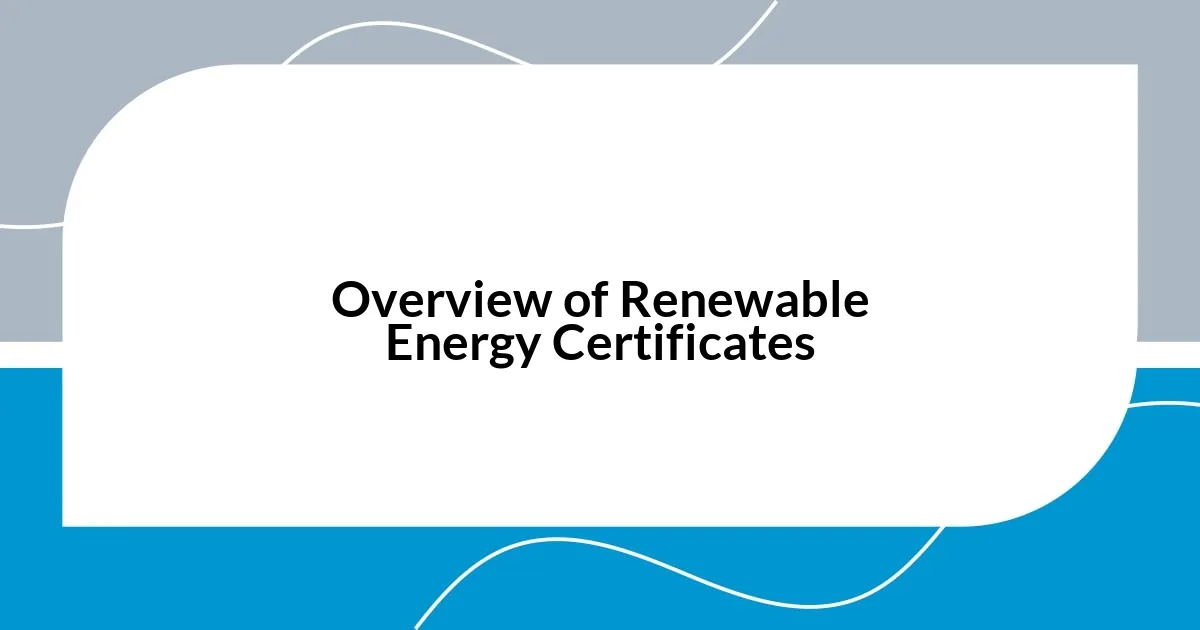
Overview of Renewable Energy Certificates
Renewable Energy Certificates (RECs) represent proof that energy has been produced from renewable sources like wind, solar, or hydro. I remember vividly the first time I sold a REC; it felt like a small piece of the puzzle in promoting sustainability. It raises the question, how many people actually understand the value these certificates provide in supporting cleaner energy?
When a business or individual purchases a REC, they’re essentially investing in green energy, which can offset their carbon footprint. I often found myself pondering the impact of these purchases—in a world where every action counts, isn’t it amazing to think that buying a simple certificate can help drive significant changes in our energy landscape?
Moreover, RECs help incentivize renewable energy production by creating a market where producers can monetize their efforts. During my time in this sector, I was struck by the enthusiasm of renewable energy producers; they were not just selling power, but also the hope of a cleaner future. Isn’t that an exciting merge of profit and purpose?
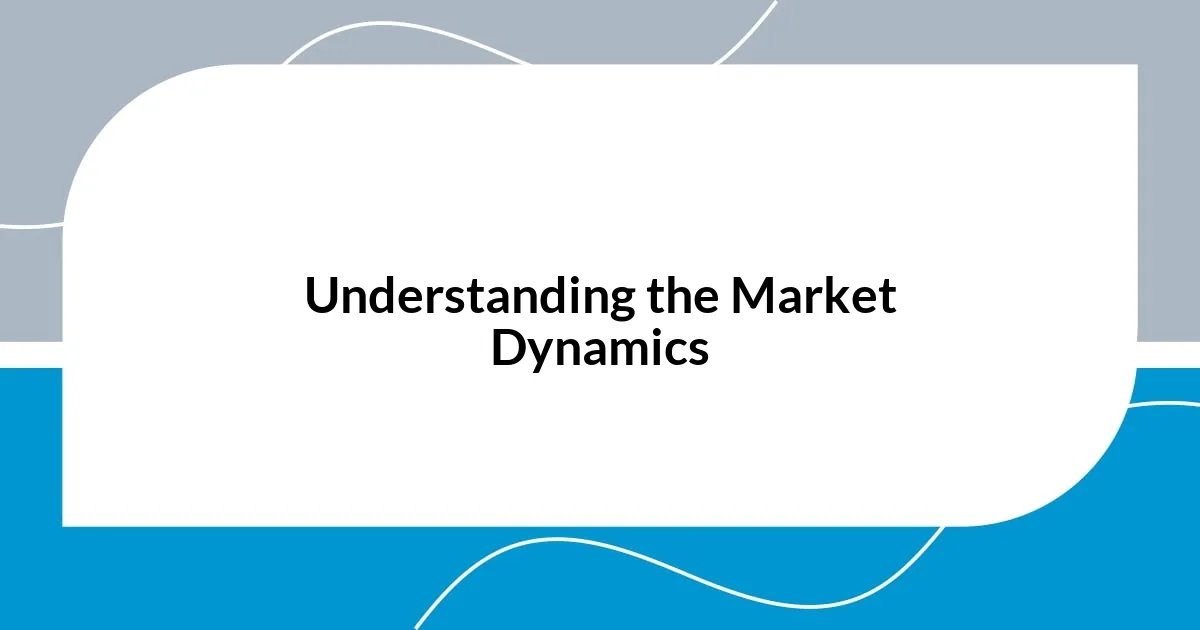
Understanding the Market Dynamics
Understanding the market dynamics of Renewable Energy Certificates (RECs) is both fascinating and complex. From my experience, one key driver is the regulatory framework, which varies significantly by region. Policies that mandate renewable energy usage can create an increased demand for RECs, making them more valuable. I recall a time when a sudden policy change spurred a rush for certificates, highlighting just how quickly market conditions can shift.
Here are some important factors influencing the REC market:
- Regulatory Framework: Different states and countries have varying mandates which can greatly affect supply and demand.
- Market Participants: The players range from individual consumers to large corporations, each with distinct motivations for purchasing RECs.
- Price Fluctuation: Just like any commodity, the price of RECs can rise and fall based on market forces, which means staying informed is crucial.
- Consumer Awareness: Increasing knowledge about climate change impacts consumer behavior, often leading to greater investment in renewable energy sources.
- Technological Advances: Innovations in renewable energy production can affect how many RECs are created and their overall market value.
Navigating these dynamics can feel like a rollercoaster, especially when unexpected shifts occur. In one instance, I witnessed a major utility company scramble to purchase RECs ahead of a looming compliance deadline. It was an intense moment, showcasing how these market forces can create both opportunities and challenges.
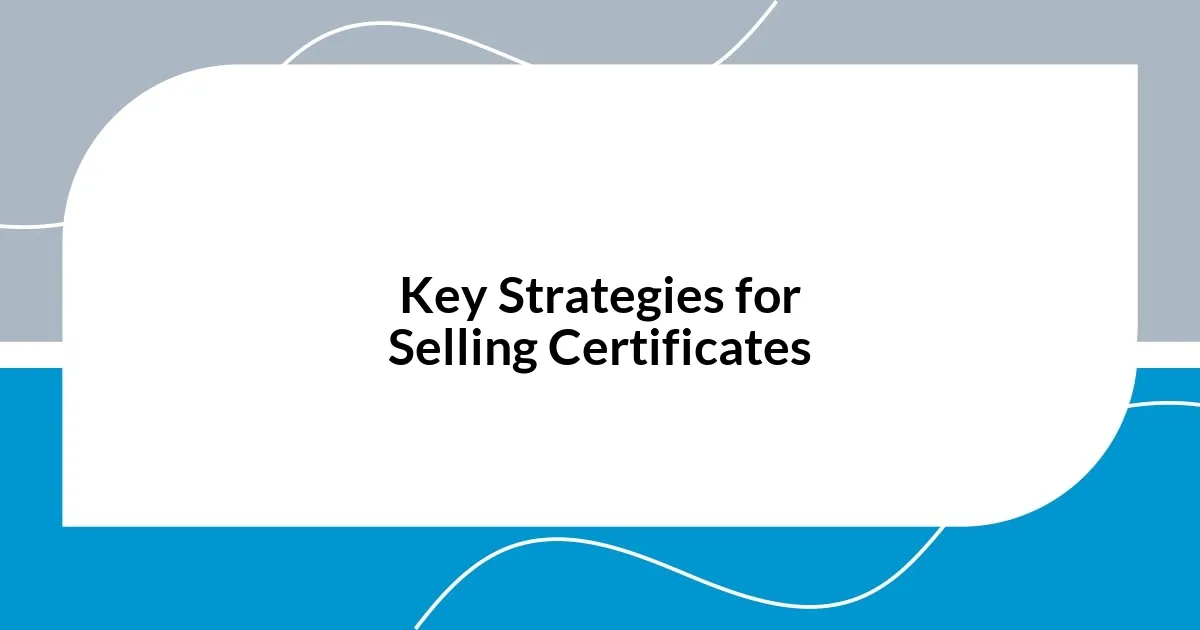
Key Strategies for Selling Certificates
Selling Renewable Energy Certificates (RECs) successfully requires a blend of strategic thinking and market awareness. One powerful strategy I’ve found is building strong relationships with stakeholders. After attending a few trade shows and networking events, I realized how essential personal connections are. These interactions allow you to understand buyers’ motivations better, which can tailor your sales approach and make it more effective. It’s about creating trust and presenting yourself not just as a seller, but as an advocate for a sustainable future.
Another important aspect is to stay updated on market trends and regulatory changes. I can tell you from experience that being in the know can mean the difference between closing a deal and losing out. I remember a time when I adjusted my sales pitch right before a new renewable energy mandate was enacted. My readiness paid off as clients were eager to understand how buying RECs could help them meet their compliance goals. This adaptability is key; being informed allows me to recognize and act on emerging opportunities ahead of others.
Lastly, I believe that utilizing digital platforms to market and sell RECs can significantly broaden your reach. I experimented with social media campaigns focused on sustainability and saw a remarkable surge in interest. By sharing personal stories about renewable energy’s impact, I connected emotionally with potential buyers, which often led to fruitful discussions and sales. People want to feel good about their purchasing decisions, and showing the human side can create that connection.
| Strategy | Description |
|---|---|
| Building Relationships | Establishing connections with stakeholders to better understand their motivations. |
| Staying Informed | Keeping abreast of market trends and regulations to adapt sales strategies. |
| Digital Marketing | Leveraging social media to reach a wider audience and create emotional connections. |
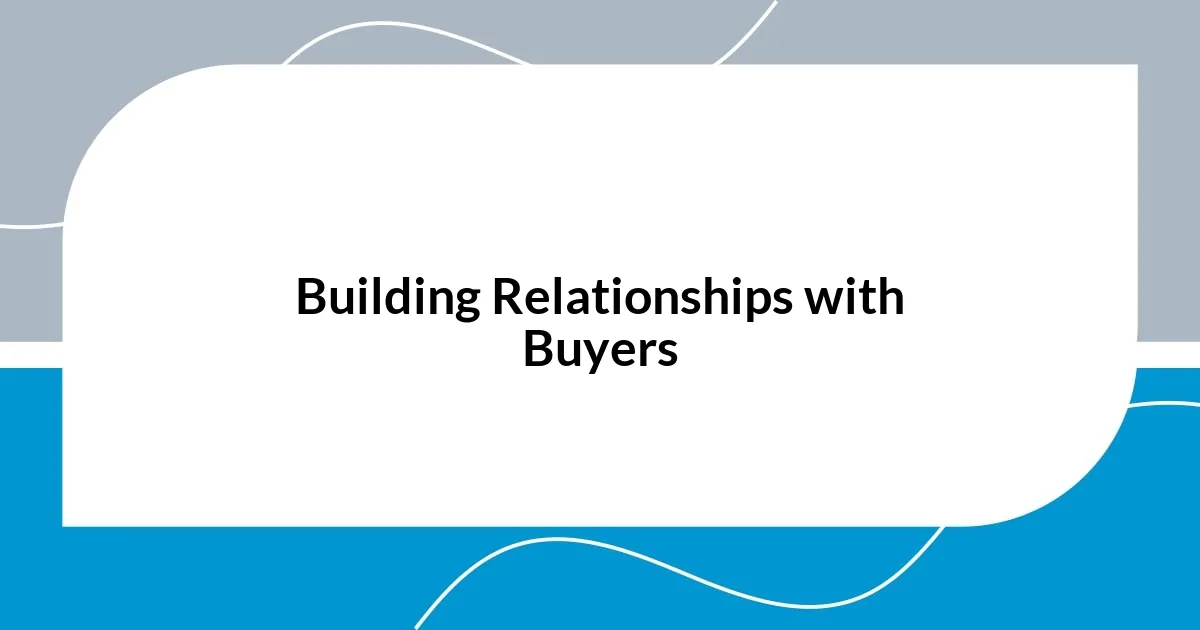
Building Relationships with Buyers
Building relationships with buyers is an art form that requires genuine engagement. I remember attending a renewable energy conference where I struck up a conversation with a potential buyer over coffee. The conversation shifted from business to our shared passion for sustainability, and that connection became the bedrock of our working relationship. I often wonder—how many deals are lost because we forget to connect on a human level?
Fostering trust and transparency is vital in this process. I’ve learned the importance of being open about the challenges my buyers might face. During one discussion, a corporate client expressed concern over meeting their sustainability goals. By sharing my own journey and the hurdles I overcame while selling RECs, I reassured them that they weren’t alone in this endeavor. This approach not only built trust but also positioned me as a partner in their sustainability mission.
Finally, it’s crucial to follow up regularly and maintain those relationships even after the sale. After closing a significant deal with an NGO, I made it a point to check in periodically. We celebrated their milestones together, which strengthened our connection. How often do we forget that a relationship isn’t just about transactions? Keeping the dialogue going allows me to stay attuned to their evolving needs, paving the way for future opportunities.
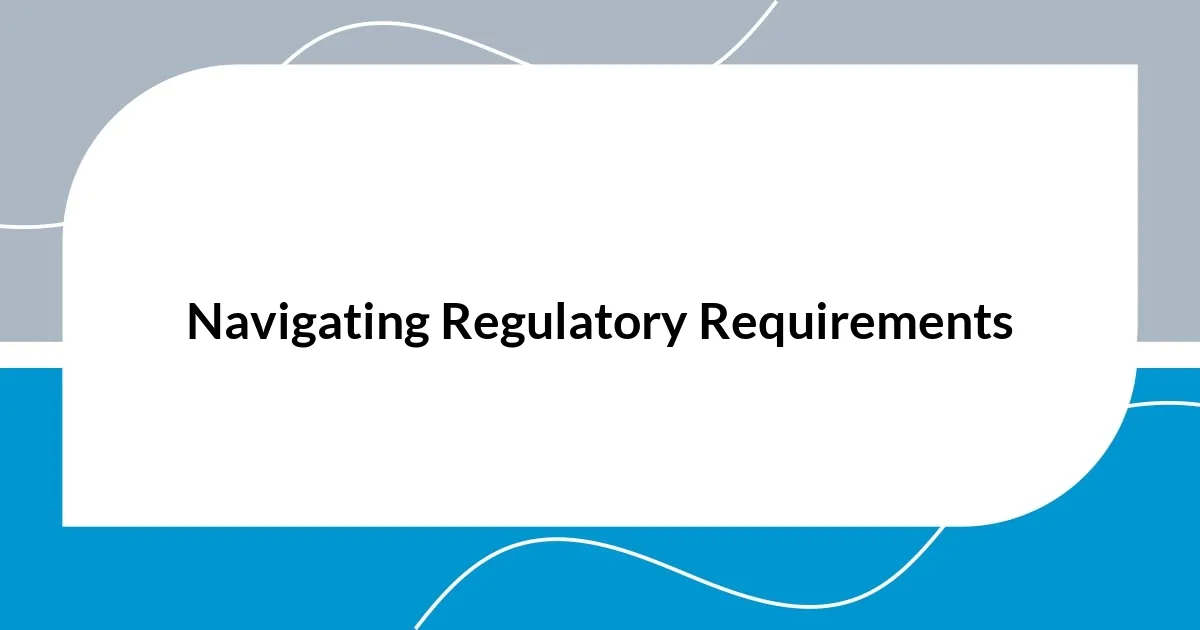
Navigating Regulatory Requirements
Navigating regulatory requirements can feel like walking through a maze. I recall my first experience with the certification process; the sheer number of documents and compliance checks was overwhelming. One key lesson I’ve learned is that maintaining an organized system for tracking regulations is essential. It’s the difference between chaos and clarity, allowing me to quickly reference what applies to my specific situation.
As I became more familiar with the landscape of regulations, I found that forming relationships with local regulators was invaluable. I once had a long conversation with a representative at a compliance seminar, and it opened my eyes to the nuances that often get overlooked. What if I had never taken that initiative? That single interaction not only clarified confusing aspects of the regulatory requirements but also fostered a supportive relationship I could rely on in the future.
It’s also important to remember that these regulations are not static; they evolve. I still think back to when a major policy shift was announced that affected REC trading. Staying proactive can mean the difference between thriving and merely surviving in the market. I often check in with industry newsletters and local advocacy groups, ensuring I’m not caught off guard. Isn’t it comforting to know that being informed can empower you to navigate any regulatory storm?
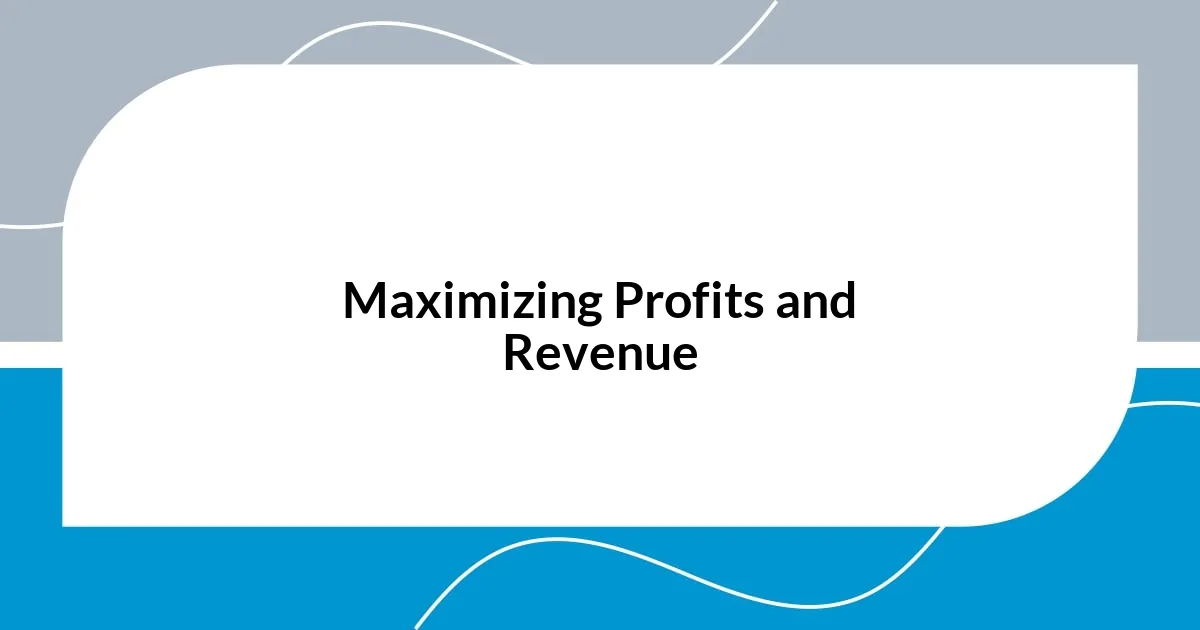
Maximizing Profits and Revenue
Maximizing profits in the renewable energy certificate (REC) market often hinges on timing and strategic pricing. I remember when I was initially hesitant to set a higher price for my RECs. After some analysis and consultation with industry peers, I chose to leverage market trends, and that decision resulted in a noticeable increase in my profit margins. It’s fascinating how understanding market dynamics can empower us to capitalize on opportunities—wouldn’t you agree that timing can be everything?
Another essential factor in boosting revenue is diversification. I found expanding my offerings beyond just RECs, such as incorporating sustainability consulting services, opened new income streams. This approach not only attracted different types of clients but also allowed me to position myself as a comprehensive resource for their sustainability needs. Have you ever considered how looking beyond a singular product can transform your business model?
Finally, effective marketing plays a pivotal role in generating revenue. When I committed to enhancing my online presence, I saw a direct correlation with increased inquiries and sales. Crafting informative and engaging content around renewable energy not only drew in potential buyers but also positioned me as a thought leader. In an ever-evolving market, don’t you think staying visible and relevant is crucial to maximizing profits?
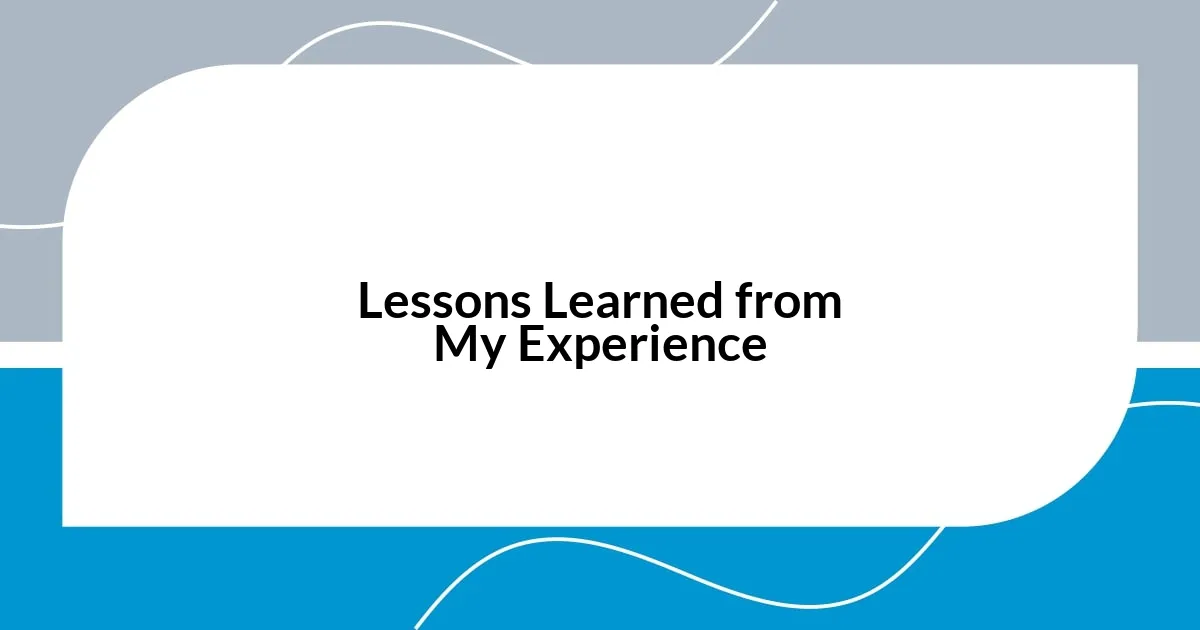
Lessons Learned from My Experience
One of the most significant lessons I’ve gleaned from selling renewable energy certificates is the importance of building trust with clients. Early on, I had a client who was initially hesitant to invest due to concerns about the legitimacy of RECs. I took the time to educate them about the process, even sharing success stories from past clients. That transparency not only eased their worries but also led to a long-term partnership. Have you ever experienced a situation where educating someone changed the outcome of a deal?
I also learned the value of listening to client feedback. During my first few months in the business, I was so focused on pushing my services that I overlooked valuable insights from potential customers. It hit me one day when a client mentioned what they felt was missing in the market. That got me thinking. By adapting my offerings based on actual needs, I was able to tailor my strategy and increase client satisfaction. Isn’t it interesting how listening can pivot your entire approach?
Moreover, resilience is crucial in this field. There were moments when market fluctuations left me questioning my strategies. I distinctly remember a week when the prices dipped significantly, and I felt the weight of uncertainty. However, I reminded myself that ups and downs are part of the game. Instead of panicking, I learned to adjust my strategies and remain focused on long-term goals. It’s a constant reminder that while we can’t control the market, we can control our responses. Have you thought about how resilience shapes your journey?